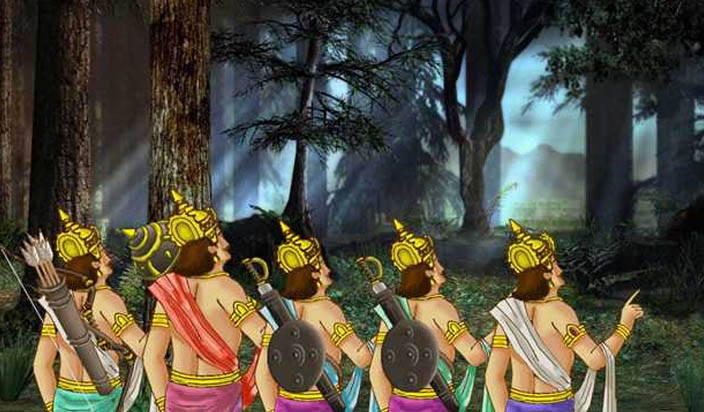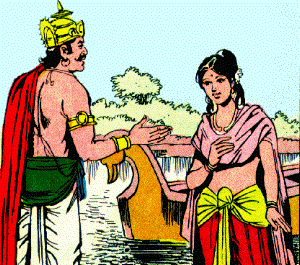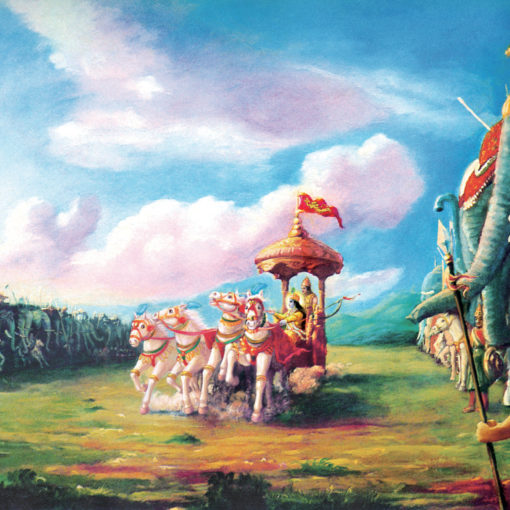After the Brahmins and attendants had left, Pāṇḍu made his way into the forest with his wives. They walked steadily north for many days and finally arrived at Saptasrota, the hundred-peaked mountain. There the king constructed a wooden hut and began to engage in severe penance. Many ṛṣis, Siddhas and Cāraṇas lived in that region and Pāṇḍu soon endeared himself to them by his qualities of humility, self-control and devotion to his elders and to God. They would frequently visit his hut to converse with him.
With his mind fixed only on salvation, Pāṇḍu lived quite simply at Saptasrota. He ate only fruits and roots and drank clear water from mountain springs. His two wives accepted the same vows he had taken, and thus all three lived joyfully on the mountain like celestials descended from the higher regions.
Gradually over time Pāṇḍu thought more about his situation. One day he spoke to the ṛṣis, revealing his fears. “O greatly learned ones, I have heard that a sonless man cannot attain heaven. By having sons one pays his debts to his ancestors. If I die without issue, my forefathers will surely perish, as the śraddhā offerings will cease. I am thus filled with apprehension because I cannot beget children.”
Pāṇḍu was anxious. He would often perform the śraddhā ceremony for the welfare of his departed ancestors. The Vedas state that such food offerings made to the gods on their behalf ensure their continued happiness in heaven. Pāṇḍu was concerned. What would happen when he died? If he left no children, who would continue the offerings to his forefathers and, indeed, to himself? He folded his palms in supplication. Could the ṛṣis beget children in his wives, just as Vyāsadeva had begotten him and his brothers?
Smiling, one of the ṛṣis replied, “By our ascetic powers we have seen that you will undoubtedly have children like the gods themselves. Indeed, your progeny will fulfill the purpose of the celestials. All this can be seen clearly by us. Therefore you should certainly act in such a way as to somehow produce children.”
Pāṇḍu reflected on the ṛṣi’s words. It seemed the sages were amenable to his suggestion. He went to Kuntī and spoke with her in private. “O lady of sweet smiles, I desire offspring, but due to my vicious behavior I have lost my power of procreation. In such instances the scriptures sanction that another worthy man may beget children on my behalf. Please, therefore, accept another man and conceive a child for me.”
Pāṇḍu pointed out that even he and his brothers had been conceived in this way. Kuntī should thus accept a qualified Brahmin, who was superior to himself, in order to have a child.
The noble Kuntī did not like Pāṇḍu’s suggestion. She looked down and spoke softly in reply, “O virtuous one, please do not request this of me. I am your lawful wife, ever devoted to you. I shall certainly not accept another’s embrace, even in my imagination. O King, embrace me to beget offspring. I shall ascend to heaven with you. Who is there superior to you?”
Kuntī recited to her husband an ancient history she had heard. There was once a powerful king who had died without issue. His lamenting wife had embraced his dead body and by the arrangement of the gods she conceived children. Three qualified sons were born of her union with her dead husband. Kuntī asked Pāṇḍu to emulate that king.
Pāṇḍu replied that he did not possess such power. He preferred she conceive a child by uniting with a ṛṣi. He assured her that no sin was attached to such an act. It was his responsibility, as he was commanding her as her husband, and she should not hesitate to comply with his request. The monarch tried in many ways to convince his wife.
At last, Kuntī, seeing her husband’s determination, said to him, “I shall tell you of a boon I received while in my maidenhood, which may yet prove to be our deliverance. When I was a girl in my father’s house, he would engage me in serving guests there. One day the powerful mystic Durvāsā arrived. By my service and constant attention to all his needs I greatly pleased that ṛṣi. As he was leaving he called me aside and said, ‘O gentle one, I shall confer upon you a boon. Listen as I recite a mantra. This mantra, uttered by you, will summon any of the celestials you desire. Whether agreeable or not they will then be obliged to do your bidding.’”
Kuntī already had experience of the mantra’s power. As soon as she had uttered it once and thought of Sūrya, that blazing deity had appeared before her. He had then conceived a son. Kuntī therefore knew that she could summon other gods to produce further children. She had not wanted to reveal this secret, being reluctant to unite even with the gods in place of her own husband. But this was an emergency. It seemed that the time to make good use of Durvāsā’s mantra had come.
Pāṇḍu, who had known nothing about the boon, was overjoyed upon hearing Kuntī’s words. This was surely the Lord’s arrangement. Sons from the gods would be far superior to any born of earthly men.
Kuntī asked her husband which of the deities she should call.
Pāṇḍu thought for some moments and then said to his wife, “O beautiful lady, you should call the great Dharma, the god of justice. He will never be able to pollute us with sin and his son will undoubtedly be qualified in every way.”
Kuntī assented to Pāṇḍu’s request. She sat in meditation and thought of Dharma, reciting the mantra Durvāsā had given her. Within moments the deity appeared, riding on a resplendent chariot. Shining like the sun, he smiled and said to Kuntī, “What should I do for you at this time?”
Awed by the god’s splendor, Kuntī replied in a trembling voice, “I desire a child by your illustrious self.”
Dharma at once united with her in his spiritual form and then disappeared. Kuntī conceived and in due course gave birth. During the eighth month of the year, at noon on a full moon day, when the auspicious star Jyeṣṭhā was in the ascendant, she brought forth a lustrous son. As soon as he was born a celestial voice was heard in the sky: “This child will be the best and most virtuous of men. He will be devoted to truth, highly powerful and famous throughout the three worlds. Known as Yudhiṣṭhira, this boy will rule the earth.”
Pāṇḍu was overjoyed. The gods had not forsaken him after all! Here was a child worthy of his great dynasty. He no longer had to be anxious.
Then he began to consider the situation. He saw that by Durvāsā’s boon Kuntī could obtain more powerful sons, born of the gods themselves, who would ensure the Kuru’s welfare and become great leaders in the world. Pāṇḍu approached Kuntī again, a year after Yudhiṣṭhira’s birth, and said, “The wise have declared that a ruler should possess strength as well as righteousness. Therefore, please invoke the wind-god, Vāyu, the strongest of the gods. By him we shall get a son who will be the most powerful man upon this earth.”
Kuntī folded her palms and bowed in assent. She again sat in meditation, this time calling for Vāyu. In moments the god appeared, riding a huge deer. In a voice that sounded like thunderclouds, the effulgent god said with a smile, “O Kuntī, what do you desire from me?”
Kuntī was bashful as she replied, “O best of the celestials, please give me a son who will possess immense bodily strength, and who will be capable of humbling the pride of everybody.”
The god agreed, and by his yogic power he approached Kuntī and conceived a child within her womb. When Vāyu’s child took his birth a voice was again heard from the sky, saying, “This child will be the best of all those endowed with strength and power.”
Pāṇḍu and Kuntī were even more joyful to see their second son, whom they named Bhīma. Along with Mādrī, and in the company of the ṛṣis and Siddhas, they lovingly raised their children in the remote and beautiful woodlands on the mountainside.
Some months after Bhīma’s birth, Kuntī was sitting near the edge of a mountain cliff with Bhīma asleep on her lap. Suddenly a tiger roared nearby. She jumped up in fear and the baby rolled from her lap over the cliff edge. Struck with horror, Pāṇḍu quickly descended the cliff. When he reached the bottom he saw the child lying unharmed amid a pile of rocky fragments. The baby had landed upon a large rock and had smashed it to pieces. In amazement Pāṇḍu gently lifted his child and took him back to Kuntī.
Even with two sons, Pāṇḍu continued to reflect on the future of his dynasty. He thought, “Success in this world depends upon exertion, but exertion is always subordinate to destiny. Yet even destiny is controlled by the will of the Supreme Lord. How then can I obtain a son who will be the best of all those devoted to the Lord?”
Pāṇḍu thought of Indra, the king of all the gods and a famous devotee of the Lord. Indra had formerly performed a thousand sacrifices for Lord Viṣṇu’s pleasure, and he possessed immeasurable might, prowess and glory. From him would surely come a son who would be superior to all.
Pāṇḍu consulted with the ṛṣis and was advised that he and Kuntī should practice an ascetic vow for one year to please Indra. At the end of that period Kuntī should summon the god with her mantra.
The monarch and his wife then accepted a vow of standing on one leg from sunrise till sunset, taking neither food nor water. They kept their minds absorbed in meditation and prayer for one complete year, with an aim to please Indra. At the end of the year Indra spoke to Pāṇḍu in his meditation. “I have become pleased with you, O King. I shall give you a son who will protect religion and chastise the wicked. He will delight his friends and relatives and slay his foes. Indeed, this boy will be the best of men.”
Following Pāṇḍu’s request, Kuntī again chanted her mantra. Indra appeared immediately, his bodily luster lighting up the whole region. By the power of the thousand-eyed Indra, Kuntī conceived, and in time a dark-complexioned child was born. For the third time the heavenly voice was heard, resounding over the mountainside: “O Kuntī, this child will be equal in strength to Indra and indeed Śiva himself. He shall be called Arjuna and he will spread your fame everywhere. He will subjugate many powerful kings and greatly increase the prosperity of your dynasty. Agni, Śiva and Indra will all be gratified by this boy’s service. He shall have no equal in prowess and will be famous throughout the three worlds.”
Overhearing this as well as other prophecies regarding Arjuna’s future greatness, the ṛṣis on that mountain were filled with joy. They uttered blessings while the celestial drums reverberated and showers of flowers fell from the sky. Many gods and heavenly sages appeared before Kuntī and offered the child benediction. Only the ascetic ṛṣiscould see them as they appeared in their ethereal forms, standing in chariots and on mountain peaks. The ṛṣis were astonished by that wonderful sight and they stood with folded palms.
Pāṇḍu was delighted. He now had three matchless sons. Seeing the wonderful result of Durvāsā’s boon, he decided to ask Kuntī to use the mantra a fourth time and summon yet another powerful god. When he approached her again, however, Kuntī refused. “O learned man, even in times of emergency it is never sanctioned by scripture for a woman to have intercourse with more than three men. Have you forgot the ordinance? I would become debased if I again conceived by another.”
The king fell silent. Kuntī was right. He decided not to ask for any more sons and continued to live peacefully in the forest with his two wives. Their three sons grew luxuriantly in their care.
Then one day Mādrī approached Pāṇḍu privately. “My lord, I do not complain that you treat me less favorably than Kuntī. Even though I am of a higher birth, I still have no complaint. My one grief is that you have no sons by me.”
Mādrī found her position unbearable. No princesses in her line had ever gone without issue. Kuntī had three sons. Mādrī had heard that Dhṛtarāṣṭra’s wife, Gāndhārī, had given birth to a hundred sons in Hastināpura. Yet she, the lawful wife of a great hero, was childless. She asked Pāṇḍu to request Kuntī to teach her the mantra. Mādrī explained that she was too shy to ask her directly, since Kuntī was her rival.
Pāṇḍu smiled. He felt compassion for his younger wife. “O Mādrī, I had already been considering this myself. I was reluctant to ask you because I was not sure how you might feel. Now that I know your mind, I shall certainly speak with Kuntī. I do not think she will refuse.”
The monarch approached Kuntī immediately. He told her of Mādrī’s sorrow and asked her to be gracious to her co-wife. Pāṇḍu made it clear that he also desired more sons to secure more fully the good of his race, including that of himself and indeed Kuntī.
Kuntī assented to her husband’s request and told Mādrī, “O gentle lady, I shall recite the mantra for your benefit. Please think of some deity from whom you desire offspring.”
Mādrī thought carefully. Most probably Kuntī would allow her to use the mantra only once. If she summoned the inseparable twin Aśvinī gods, she would get two sons at once. Even as she thought of the two gods they appeared before her, aglow with celestial splendor. Bashfully, she asked that they unite with her to conceive children and they immediately agreed. They begot upon Mādrī two boys of incomparable beauty who were named Nakula and Sahadeva. Upon their birth the divine voice said, “These virtuous and accomplished sons will transcend in energy and beauty even their celestial fathers.”
The ṛṣis performed all the rites of passage for the five boys and they grew up swiftly. Even at age one, they appeared as if they were five years old. Pāṇḍu was overwhelmed with happiness at seeing his sons’ extraordinary strength, beauty, energy and wisdom. All the boys became favorites of the ṛṣis and they sported like five Gandharvas descended to earth.
Pāṇḍu wondered if he might again have another son through Mādrī. But when he asked Kuntī if she would permit Mādrī to use the mantra again, Kuntī became angry and replied, “My lord, I was deceived by that wicked woman. Although I gave her the mantra only once, she obtained two sons. If I give it to her again I fear she may surpass me in the number of children. Pray do not ask me for this favor any more.”
Pāṇḍu reconciled himself to the fact that he would have only five sons, but he was not disappointed. His boys grew up like gods. They were all as handsome as the moon-god, Soma, and as powerful as Indra. They all became fearless bowmen who were capable, even in their early youth, of facing furious mountain lions. The ṛṣis schooled them in every facet of Vedic knowledge. The ascetics were astonished to see the boys growing so rapidly, like lotuses blooming in a lake. Pāṇḍu and his wives offered prayers of thanks to Lord Viṣṇu for their great fortune, and they went on living in the Himālayan region, raising their children with affection.





